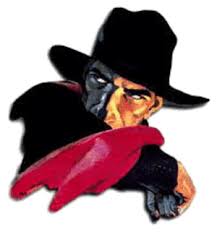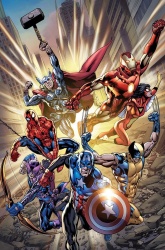 Time marched on like it's supposed to and...the audience changed. We learned things that made us ask more questions. "Why?" started coming up with increasing frequency and we sought answers in places that made us look for other parties to hold responsible than whoever happened to be drawing our attention. We wanted to know not only who was behind them, but why our superheroes weren't doing something about them.
Time marched on like it's supposed to and...the audience changed. We learned things that made us ask more questions. "Why?" started coming up with increasing frequency and we sought answers in places that made us look for other parties to hold responsible than whoever happened to be drawing our attention. We wanted to know not only who was behind them, but why our superheroes weren't doing something about them.This is to say that heroic figures as powerful as some of those presented in popular adventure fiction should also be running about like Fox Mulder, shining lights in dark corners where a lot of folks don't want those lights shining. If these icons were going to truly uphold their ideals, Superman and Wonder Woman would be fighting corrupted governments to protect the oppressed masses, Batman would be more wanted than Rorschach for having exposed the secrets of the Kennedy assassinations and a litany of other shadowy operations far more disturbing than a midnight mugging (though fighting street crime obviously holds a special interest for him, considering...) and Thor would have been labeled an eco-terrorist years ago for his hard stance against pollution. A wise Professor Xavier would use his resources to lead his civil rights activists discreetly lest they draw armed opposition. These and other powerhouses would be targets of The Man.
These sorts of scenarios don't seem to be much focused upon in our fiction. In fact, the Comics Code Authority placed a specific ban upon any creative avenues that would cast authority figures in a bad light. Modern heroic tales go further in that direction from time-to-time since they set the CCA aside, but the protagonists still work largely within the confines of the established order and political powers don't spend their time figuring out how to track them down and kill them in their sleep. In that regard, The Man (in his many guises) probably appreciates the distraction afforded by supervillains, natural disasters, alien invasions and random street crime.  Who knows what evil lurks in the hearts of men? The Shadow Government says it does. Still, there remains the issue of our heroes not being who they appear to be.
Who knows what evil lurks in the hearts of men? The Shadow Government says it does. Still, there remains the issue of our heroes not being who they appear to be.
 The mystery men and women we call superheroes are much more than their colorful public personas, just as our parents had lives of their own before they started raising children. Many of our iconic heroes are truly nothing like the champions they pretend at being. Behind their costumes, they are royalty (Thor, Wonder Woman, Aquaman, Black Panther, Sub-Mariner), they are the wealthy upper-class (Batman, Zorro, Green Hornet, Iron Man, The Wasp), they are doctors and scientists and government agents. Some are even mild-mannered members of the respected news media (Superman, Captain Marvel). If we want to push the issue of how much the government really knows and covers up, a few of those capes belong to aliens and alien-human hybrids. Can you fight The Man when you are The Man?
The mystery men and women we call superheroes are much more than their colorful public personas, just as our parents had lives of their own before they started raising children. Many of our iconic heroes are truly nothing like the champions they pretend at being. Behind their costumes, they are royalty (Thor, Wonder Woman, Aquaman, Black Panther, Sub-Mariner), they are the wealthy upper-class (Batman, Zorro, Green Hornet, Iron Man, The Wasp), they are doctors and scientists and government agents. Some are even mild-mannered members of the respected news media (Superman, Captain Marvel). If we want to push the issue of how much the government really knows and covers up, a few of those capes belong to aliens and alien-human hybrids. Can you fight The Man when you are The Man?
Because of the very magnitude of our biggest heroes, they couldn't honestly be allowed to build careers on being rebels against governmental administrations because as loose cannons they couldn't be trusted. They'd quickly be painted as selfish individualists possessed of dangerous abilities that needed to be put in check ASAP. If anything, it looks as though we've been conditioned to celebrate extra-legal champions of the common man while being slipped a simultaneous message to blindly trust the wealthiest and most prestigious among society's power structure as figures of authority. Conversely, it means we can't trust them to stand against the most pervasive forces in our lives. Does that count as sneaky when it's been done right in front of us for decades? Does conditioning us from childhood count as sneaky?
Even when they operate outside the strict letter of law, these heroes remain figures of order and justice, poster children of The Conspiracy that makes itself invisible through immensity. As long as they're to secretly remain integral parts of traditional, institutional society and not be branded enemies of the state, bucking the system and rebelling against The Man will have to remain practices of the common man. The common man created society and has to bear the responsibility of policing it while our heroes use their superior attributes to grab headlines for transitory accomplishments of lesser significance. I still enjoy their adventures in the right context, but I know they can't save us from ourselves or the monsters we've unleashed. Only we have the power to do that.

Fascinating blog. Superman obviously had ties to American propaganda early on with his exploits battling Japanese and Nazis soldiers. But what about Superman challenging Lex Luther, the wealthy elite with subversive motives, or Batman battling corruption among Gotham P.D. by helping Gordan? Do these not count as fighting against "The Man"?
ReplyDeleteLex Luthor can't conspire well. He's not good as a group guy. He likes to make his own rules and strive for the top of any heap, making him very elite by default. He's a rogue scientist/supervillain at heart, always setting himself apart. His modern status as a wealthy industrialist has just given him more layers he can use to buffer himself from the reach of Superman and the law. When he's at his most corporate, Luthor just looks like the man as he plays in his own shadow empire. As for Batman, battling corruption in Gotham is still little more than the show of fighting crime. Neither hero, despite the resources at their disposal, seems inclined to do more. They allow themselves to play about in an unending Kobayashi Maru scenario because they refuse to live up to their potential as icons and lead true societal change.
Delete